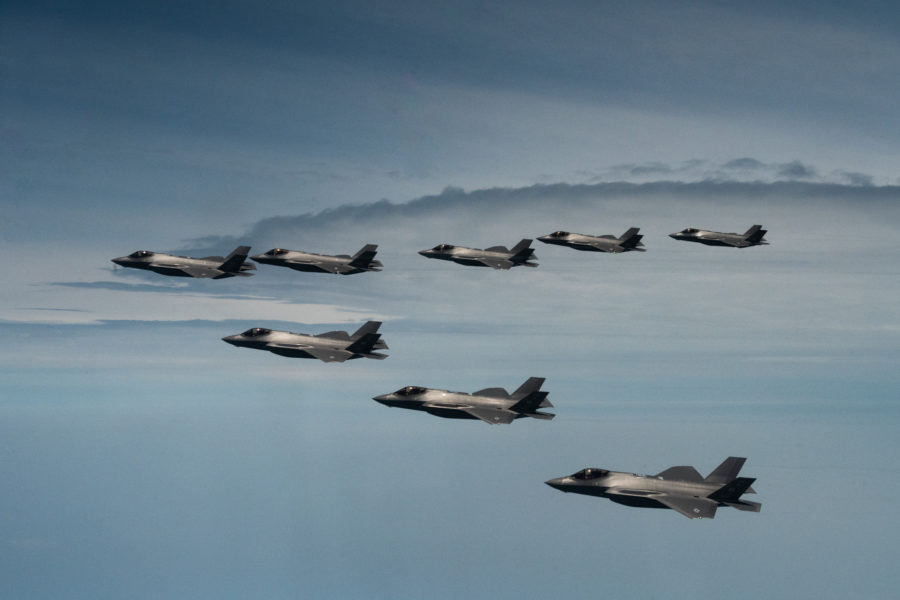Air Force Secretary Frank Kendall said he’s “comfortable” with the department’s fiscal 2024 budget request, saying it is sufficient when viewed alongside with the enacted 2023 budget—his biggest concern is not a matter of resources, but getting timely funding.
Rep. Rob Wittman (R-Va.), vice chair of the House Armed Services Committee, disagreed, though, saying the budget should at least keep up with inflation, although he’s satisfied with the number of fighters the Air Force is buying.
In pre-recorded remarks streamed during a virtual event hosted by The Hill, Kendall noted “we had a pretty large increase in our budget in FY23. So we’re adding on to that increase, which has already taken place.” The Department of the Air Force is requesting about a four percent increase in funding from 2023 to 2024, with Space Force slated to get a larger bump than the Air Force.
“The increases we are getting are going to take care of the things that we need the most to move forward, modernize and transform,” Kendall said.
“We have got to respond” to China’s military advances, he added. For 30 years, China has developed counters to the U.S.’s small number of high-value assets such as aircraft carriers, forward air bases, “and a relatively small number of satellites in orbit, in very predictable paths,” Kendall said. “China’s been acquiring the means to attack all those assets, and others such as the logistics [and] command and control nodes.”
The Chinese have increasingly fielded a broad array of missiles to to attack those nodes, Kendall noted, and they have been “modernizing their conventional forces in order to take us on in some of the areas we’ve depended upon for a long time, like stealth, for example.”
Considering China’s surging capabilities in areas like hypersonic missiles, risk for the U.S. has risen Kendall said—and responding requires “some pretty fundamental changes in some cases,” he said, arguing the 2024 budget addresses many of those.
Kendall said one of the areas he’s most excited about in the budget are Collaborative Combat Aircraft, which will fly in formation as unmanned, autonomous wingmen to crewed fighters.
The Air Force’s 2024 budget request includes about $500 million for CCA research and development, and that total balloons to nearly $6 billion over the next five years.
Asked what causes him to lose sleep, Kendall repeated a quote from Gen. Douglas MacArthur he frequently uses that any military failure can be summed up by the words: “too late.”
“I’m concerned about us being too late to make the changes that we need to make,” Kendall said, and when Congress consistently fails to pass a budget on time, it costs billions and burns up time which cannot be recovered.
New starts and modernization “all start…with getting the funding,” he said.
A Different View in Congress
But while Kendall defended the budget request, Wittman—who also serves as chair of Tactical Air and Land Forces subcommittee—said the Pentagon’s overall spending plan is inadequate.
“I think it falls far short of what we need to do to make sure we’re countering China,” Wittman said, appearing separately during the virtual event. While the proposed DOD budget represents a 3.2 percent increase over 2023 funding levels, “we know the rate of inflation is six percent,” Wittman argued, saying the Pentagon’s budget should, at a minimum, keep up with the rate of inflation.
The budget is “just keeping up with what we did last year,” Wittman said, adding that China has already announced a defense spending increase of seven percent this year “and we know they’re not transparent about how much they spend.” China’s rate of producing ships and aircraft “are pretty startling and sobering for the nation,” and the U.S. should stay ahead of that outlay, he asserted.
Wittman also said he’s puzzled by the “invest to divest” strategy whereby the military services—including the Air Force—retire old systems to pay for new ones.
While he indicated that he is pleased by the service’s requests for F-35 fighters and B-21 bombers, “it’s hard for me to know how we do addition by subtraction.”
Building 85 F-35s in 2024, as the Pentagon wants to do across the services, “keeps us on track,” Wittman said, and he praised the B-21 bomber as a “a good news story” that is “staying on time and on budget.”
But expressing alarm at the stealthiness of China’s J-20 fighters, Wittman said he wants to make sure the Air Force’s Next-Generation Air Dominance (NGAD) program “stays on track.” He also voiced support for the CCA concept, but said it must be backed up by a sensor network “from space to Earth” that will be resilient enough to withstand Chinese attempts to disrupt it.
Wittman said he’s confident the House will be able to pass a defense budget this spring, despite disparate calls from his party for both more and less defense spending.
“I think people realize … with a slim majority, none of us are going to get everything we want,” he said. While many will want to force large-scale changes in overall spending, “realistically, we’re not going to be able to do that.”
“What we need to do is to find the bill that aligns itself with the largest number of members,” Wittman said. “I think that we can do that. I think people understand that. If we don’t do that … and have it gather 218 votes, it’s going to be very difficult for us to negotiate on anything with the Senate or the President. So that’s the starting point. And I feel very good about what’s happening in these listening sessions to take all this information and put together something that can get 218 votes, and I think we have to do that sooner than later.”
